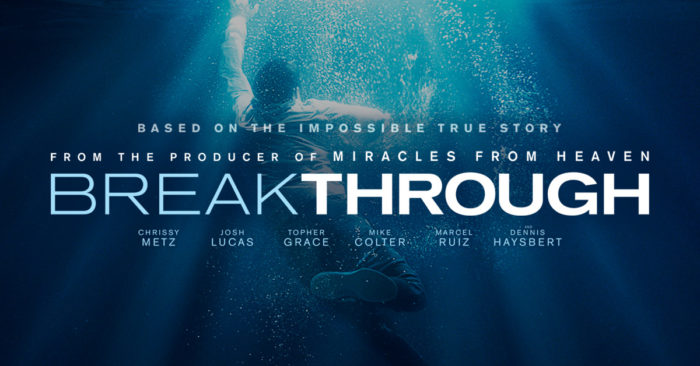Belief in the Supernatural Builds Faith in ‘Breakthrough’
“Mommy, I’m scared to go to bed. What if there are ghosts in there?”
Should tell my daughter ghosts aren’t real? I’d believed that most of my life as do many Christians. But I stopped with the words dangling on the tip of my tongue. Saying ghosts don’t exist felt like a lie.
In 1 Samuel 28, Saul visited the medium at En-dor in order to gain counsel from a deceased Samuel. The medium was able to bring up the spirit, and the late prophet revealed Saul’s identity to the medium and prophesied about the coming battle. From my understanding, this passage implies that not only was Saul in sin when he visited the medium but was truly speaking with Samuel’s spirit.
Rather than go into the theology of ghosts with a seven year old, we talked about the power of God and the protection he gives us from bad guys. We even included Jr. Asparagus singing, “God is Bigger” in our bedtime devotions.
What does any of this have to do with the new Christian film, Breakthrough? Ask yourself this, “Does my lack of belief in the supernatural weaken my faith in God to work miracles?”
The theme of Breakthrough—based on real events—was faith and the power of prayer. We can ask God for miracles, and he is able to answer us in tangible, supernatural ways.
What was striking about this film was the contrast between the mother, Joyce Smith (Chrissy Metz), and father, Brian (Josh Lucas), of the sick boy, John (Marcel Ruiz). Joyce cried out for God to bring her child back from the brink of death throughout the film, while Brian didn’t think God was even capable of answering his wife’s prayers.
Sadly, Brian’s reaction to their situation is far more common within the Western Church than we would like to admit. With our culture’s bent toward materialism and a lack of spirituality, we can miss the working of God even when he punches us right in the gut with it. Even Christians who study the miracles of the Bible struggle to believe the same things are possible in modern times.
But the God who parted the Red Sea, bestowed Sampson with supernatural strength, and cast out demons through the hands of the disciples is still working in our lives today. As strange as it may seem, it is on God’s authority that Satan afflicted Job with such horrific suffering (Job 1:6-12, Isaiah 45:7), and it is on that same authority that the medium at En-dor successfully called forth Samuel’s spirit. Was it evil? Without a doubt! Samuel himself delivers the news to Saul that he’d become the Lord’s enemy. But despite that, God used that sin for his own purposes and glory.
Western believers tend to react to magic and Eastern spiritualism in one of two ways—fear or fake. Fear: The Bible says magic is real and evil, therefore we should teach our children to fear it. Fake: Magic and ghosts are secular myths and have no place within Christianity.
But do either of those produce a heart ready and able to ask God for big things? To pray for a loved one to be brought back to life as Joyce Smith did in Breakthrough?
Sometimes faith is a “leap” as the saying goes, but most of the time, it is based on experience and reason. I believe the chair will hold me when I sit down because of physics and my experience with chairs. Similarly, I have faith that God can work miracles because I know that supernatural things are real, because I have seen God work miracles in my life before, and much more.
It would have been easy for me to teach my child that ghosts aren’t real, and she has no reason to fear. But that wouldn’t have been the truth. Instead, look not to the material world to calm your fears and the fears of your children, but to an all-powerful, sovereign God who can and will raise people like John Smith from the grave. As we see in books like Job and the gospels, God has authority over all creation. He is our good Father who watches over us as we sleep.







































Reflecting on my own childhood…I don’t know. I was always told ghosts weren’t real, but it didn’t stop five year old me from imagining them and thus getting too creeped out to go into dark rooms alone. I didn’t believe ghosts were real, though I still believed spiritual entities like demons existed (I assumed they weren’t actually chilling out in my room). Buuuut, at that age it kind of didn’t matter what I believed because I would always get creeped out IMAGINING something was there, even if I rationally knew there wasn’t. Some of that fear is human instinct that children have once they learn there are malevolent things in this world. That’s actually kind of good. Imagine a tribal society that shares territory with predatory animals. If children weren’t afraid of the dark or that things could hurt them, they would wander away from the adults or the firelight and get eaten. Fear is an important instinct, so long as we don’t take it to extremes.
As we get older, we just have to strike a balance between being cautious and careless. So in addition to the ‘God is bigger’ thing, maybe it’s important for parents to discuss the fact that fear is something to pay attention to since it keeps us safe, but that we shouldn’t go overboard with it.
One thing that could help would be to make her logically/rationally question what she thinks about ghosts and all that, that way, whether or not she’s still fearful, she still gets a lesson on how to ask the right questions in life. ‘Why do you think there would be ghosts in your room? What makes you think the ghosts would hurt you?’ etc, etc. If she says ‘because that’s what’s on tv’, then you could ask why she believes the tv, or let her know that a lot of the ghosts stories on tv are made up for entertainment(even on documentaries), and that even if ghosts are real, that doesn’t mean people on tv know what they’re actually like. In either case, such questions provide insight into how a child thinks, so asking doesn’t hurt since it can provide useful into in the long run.